| Srl | Item |
| 1 |
ID:
098126


|
|
|
| 2 |
ID:
126130
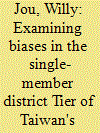

|
|
|
|
|
| Publication |
2013.
|
| Summary/Abstract |
Two elections to the Legislative Yuan have been held under a mixed parallel system. While there have been criticisms that this new set of rules leads to a considerable disparity between parties' vote and seat shares in the district tier, in so far as the new electoral system has been accepted and therefore treated as given by both parties and voters, its fairness should be assessed not by the degree of proportionality, but rather by examining various sources of potential bias. These include differences in electorate sizes and turnout rates across districts, and the efficiency by which votes for the main parties' candidates are distributed. The present study investigates how "fair" the functioning of Taiwan s new mixed parallel system was in the 2008 and 2012 legislative elections by simulating equal and reverse vote scenarios at the district level, and measuring the magnitude of each component of electoral bias. The results show that the operation of the electoral system entails no marked partisan bias, since it does not consistently confer an advantage to either of the main parties or camps.
|
|
|
|
|
|
|
|
|
|
|
|
|
|
|
|
| 3 |
ID:
190418
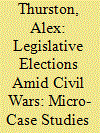

|
|
|
|
|
| Summary/Abstract |
This paper investigates ruling parties’ calculations in wartime legislative elections. The paper argues that ruling parties’ strategies are shaped by opportunity structures and the party’s desire to protect party insiders, rather than simply by considerations about ‘government-held’ or ‘rebel-held’ territory. Ruling parties may adopt several strategies: (1) ceding seats to popular opposition candidates, even in government-controlled territory; (2) allowing rebels to run on the ruling party’s ticket; and (3) blatant electoral manipulation. Ruling parties may miscalculate, including about how much manipulation the population will countenance. The paper examines these dynamics through a case study of Mali’s 2020 legislative elections.
|
|
|
|
|
|
|
|
|
|
|
|
|
|
|
|
| 4 |
ID:
141413
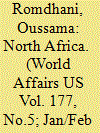

|
|
|
|
|
| Summary/Abstract |
Tunisians were holding their breath as the country got ready for its first legislative elections since the Arab Spring revolution. Jihadists threatened to derail the electoral process. Three days before the October 26th vote, security forces disrupted a terrorist plot in the south. A day later, they struck a jihadist hideout near Tunis, the capital; six suspected terrorists, including five women, and one security officer were killed in the clashes.
|
|
|
|
|
|
|
|
|
|
|
|
|
|
|
|
| 5 |
ID:
162211
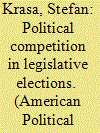

|
|
|
|
|
| Summary/Abstract |
We develop a theory of electoral competition in multidistrict legislative elections when nomination decisions are made by local policy-motivated party members, and voters care about both local and national positions. We show that the asymmetry generated by different national party positions reduces or even entirely removes the competitive pressure to nominate moderate candidates. The model has important implications for our understanding of policy divergence and, in particular, of the effects of gerrymandering.
|
|
|
|
|
|
|
|
|
|
|
|
|
|
|
|
| 6 |
ID:
162212
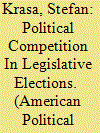

|
|
|
|
|
| Summary/Abstract |
We develop a theory of electoral competition in multidistrict legislative elections when nomination decisions are made by local policy-motivated party members, and voters care about both local and national positions. We show that the asymmetry generated by different national party positions reduces or even entirely removes the competitive pressure to nominate moderate candidates. The model has important implications for our understanding of policy divergence and, in particular, of the effects of gerrymandering.
|
|
|
|
|
|
|
|
|
|
|
|
|
|
|
|
| 7 |
ID:
182592
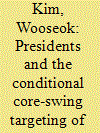

|
|
|
|
|
| Summary/Abstract |
In this article, I present a theory of conditional core-swing targeting that focuses on the competition for majority control in legislative elections to explain how presidents use their strong budgetary powers to manipulate the distribution of the national subsidy in South Korea. Presidents whose parties already possess a legislative majority are expected to favor core municipalities to strengthen the foundations of their majority constituency, whereas those who seek majority control are predicted to prioritize swing municipalities in an effort to cross the majority threshold. Presidents are also anticipated to respond to the electoral cycle by shifting subsidies to riskier municipalities when elections approach. Using a novel data set on national subsidy allocations that spans three decades, I find evidence in favor of the hypotheses. This article demonstrates that the beneficiaries of distributive favoritism are not fixed, and that politicians can engage in complex and varied targeting strategies to achieve their objectives.
|
|
|
|
|
|
|
|
|
|
|
|
|
|
|
|